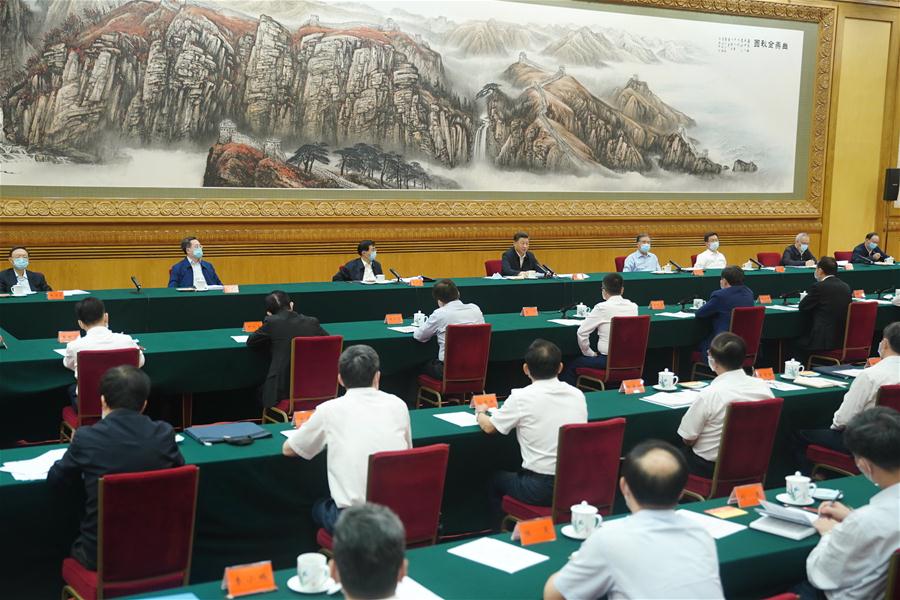Entrepreneurs confident after Xi vows multi-pronged support
Entrepreneurs have drawn inspiration from President Xi Jinping's recent interaction with executives at a symposium, gaining added confidence to make up for the losses caused by COVID-19 and strive for positive economic development throughout the year.
Entrepreneurs have drawn inspiration from President Xi Jinping's recent interaction with executives at a symposium, gaining added confidence to make up for the losses caused by COVID-19 and strive for positive economic development throughout the year.

Chinese President Xi Jinping, also general secretary of the Communist Party of China Central Committee and chairman of the Central Military Commission, chairs a symposium with entrepreneurs in Beijing, capital of China, July 21, 2020. [Photo/Xinhua]
"We feel warm and assured in our hearts, and have gathered more strength for development," said Jiang Bin, chairman of Goertek Inc., after learning that Xi chaired the symposium and talked with executive representatives from businesses with various forms of ownership Tuesday.
At the symposium, seven entrepreneurs shared their opinions and made suggestions on the current economic situation, the protection of market entities, sci-tech innovation, the deepening of reform and the forthcoming 14th five-year plan for social and economic development.
After listening to their suggestions, Xi made a speech, calling for more efforts such as providing relief, expanding the market, improving the business environment and promoting innovation to enable enterprises to play a bigger role and achieve greater development.
More than a pep talk
The symposium came as the Chinese economy posted a better-than-expected recovery in the first half, with its gross domestic product expanding 3.2 percent year on year in the second quarter, following a 6.8-percent contraction in the first quarter.
But challenges remain given the continuous global spread of the virus and mounting external risks.
For entrepreneurs like Jiang, Xi's speech was more than a pep talk amid economic headwinds, as Xi has urged more direct and effective policy support to help businesses overcome difficulties concerning rent, fees and taxes, social insurance and financing.
As his company has quickened its business resumption with policy support, Jiang said he was expecting profit growth of 45 percent to 50 percent in the first half of the year.
Jiao Yuchang, owner of a roast chicken firm in Harbin, capital of northeast China's Heilongjiang Province, said he was "very proud" as Xi commended the contributions made by over 82 million self-employed businesses in his speech and promised to pay close attention to the development of the business group.
With the firm's business spending expected to decrease by over 1 million yuan (about US$143,000) this year thanks to government relief policies, Jiao said he had more confidence in his business and would continue to bring "the safest and most delicious food to the market."
The confidence of foreign-funded enterprises has also been shored up as Xi underlined measures to create a market-oriented, law-based and internationalized business environment.
Wang Tong, executive vice president of Samsung Electronics China, noted that Samsung makes more than US$25 billion of purchases in China each year, and the country hosts more overseas research and development subsidiaries of the firm than any other market.
"As COVID-19 spreads throughout the world and China helps spearhead the global economic recovery, President Xi reassured everyone at the symposium that China would not close its doors, but would open ever wider instead. His remarks sent a positive signal to the world economy and brought enterprises worldwide confidence in future development," Wang said.
"Since the country started its reform and opening-up over 40 years ago, China has been attracting global attention with its openness," said Zhao Bingdi, president of the board of the Panasonic Corporation of China, noting that foreign-funded enterprises are full of expectations for a better business environment.
Rise to challenges through innovation
In response to Xi's call to make up for the losses caused by COVID-19, China's state-owned enterprises are vying to bolster greater development by tapping into new opportunities.
"With crises come opportunities, and it is the innovators that will emerge victorious," said Ning Gaoning, chairman of chemical firm Sinochem Group.
To offset the fallout of the epidemic and meet corporate targets as planned, Sinochem is seeking to transform itself into a science and technology innovation enterprise boasting independent intellectual property rights and high value-added products, according to Ning.
Healthcare group Sinopharm is also aiming high, with a plan to set up an entire innovation-driven industrial chain during the 2021-2025 period, said Liu Jingzhen, chairman of the company.
In his speech, Xi encouraged entrepreneurs to advance innovation in production organization, technology and market, and suggested they prioritize technological research and development and human capital investment.
Xi also called for elevating the modernization level of the industrial and supply chains and fostering new advantages for future development.
In response, high-tech firm Futong Group said it would further explore the country's huge domestic market, seize the opportunities from 5G development and actively deploy the whole industrial chain of optical fiber communications and big data centers, according to the company's chairman Wang Jianyi.
Lenovo Group strives to promote intelligent manufacturing and plans to invest over US$300 million to build modern intelligent factories in Shenzhen.
Yang Yuanqing, chairman and CEO of Lenovo Group, said the company hoped to be a pioneer in the field and help more Chinese manufacturers promote digitalization, automation and intelligence in production in the future.

